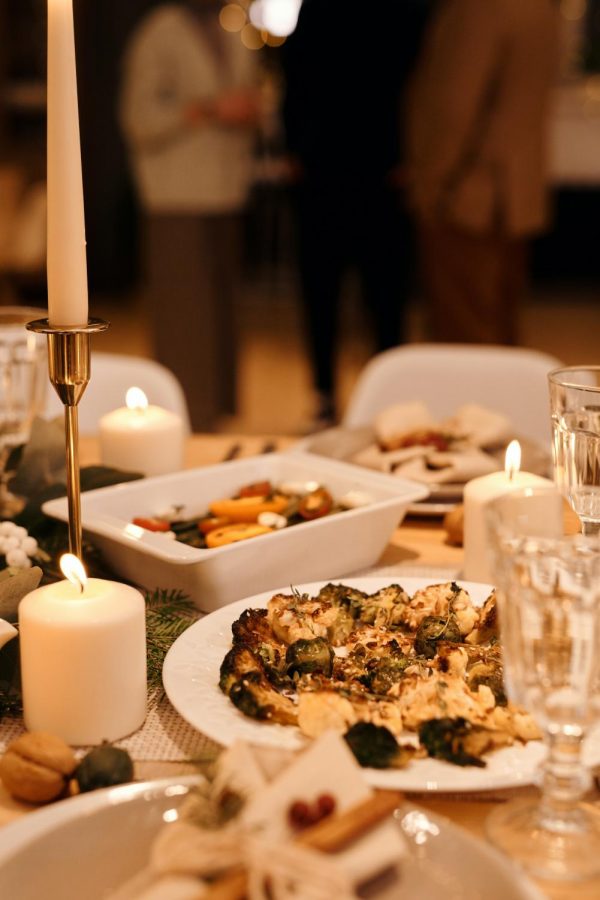The Gift of Balance: 4 Tips to Navigate Diet Culture & Food Anxiety This Holiday Season
Photo by: Photo by Nicole Michalou from Pexels
The constant presence of indulgent seasonal foods can create additional stress during the holiday season. From receiving unwanted commentary from others, to facing food-fears and fighting the urge to restrict or binge, the holidays can be grueling at times. This year, ditch the diet culture and give yourself the gift of balance this holiday season.
It’s easy to picture – you sit around the dinner table, excited to enjoy a lovely holiday meal. As you make your plate your mother asks, “Are you really going to eat all that?” Meanwhile, from across the table your aunt exclaims, “The diet begins tomorrow!” The holiday season can be a difficult time for those who have a turbulent relationship with food. Thanksgiving and Christmas are times of joy and celebration, yet we are often bombarded with mixed messages and dangerous diet culture propaganda. Your feed is filled with articles telling you how to “burn off” those Christmas cookies, or cut calories to prevent gaining holiday weight, meanwhile your friends and family are sharing the recipes for their most indulgent holiday desserts. Harmful diet talk tells us to restrict ourselves in an environment where food is supposed to be abundant, then makes us feel guilty for not participating in traditions. The effects of diet culture damage our self esteem and can hurt our relationship with food and our bodies; however there are ways we can try to navigate the world of diet culture this holiday season.
1. Making a Plate
Enter the holiday season knowing that nothing is off limits. Your body requires a variety of nutrients, and every food you consume supports your body to function. Carbohydrates are the sole source of energy for your body, fat helps your body to absorb vitamins A, D and E, and promotes cell growth, and sugar can boost your mood and helps to store energy in the body. In addition, making a healthy plate means meeting your emotional needs as well as your physical needs. Eating in an intuitive way and practicing gentle nutrition has been proven to heal unhealthy relationships with food and support a balanced lifestyle.
Intuitive eating is an ant-diet that practices being in tune with one’s body through listening to and honoring the body’s natural hunger cues and cravings. Listen to your body this holiday season. Eat what you want, whether it be buttery mashed potatoes, a green salad, or both, and avoid what you don’t enjoy. Too often people have an all or nothing mentality, they feel they must binge on novelty foods with the promise that they will then restrict and diet come January. Practice gentle nutrition by enjoying the foods you love without restriction and adding things that make your meals and snacks more nutritionally balanced and nutrient dense.
2. Exercise
Finding balance between food and exercise can be difficult to navigate. Oftentimes we try to counteract or out-train holiday treats with excessive exercise, or we don’t exercise for months at a time during the holidays. This season, practice joyful movement, rather than excessive training that comes from a place of insecurity, or pushing off exercise until the new year. Find a form of movement that brings you happiness and makes you feel good. If that means attending the gym everyday, that’s okay. Otherwise you can walk your dog, go on a hike with family, or take a yoga class with friends. View and use movement as a way to show kindness to yourself, feed your soul, and fuel your body and mind.
3. Diet Talk
While we’re already faced with our own fears and anxieties around food, we are also often subjugated to harmful diet talk and unsolicited commentary from our friends and family during holiday gatherings. If and when those around you make comments that you find damaging or triggering, it is important to respond, shift the conversation away from diet talk, or leave a conversation you’re uncomfortable participating in. Remind yourself that it is not your job to please others, or allow others to dictate what you do or don’t eat, and prepare a statement to respond to any hurtful comments. This doesn’t mean you need to start a confrontation with your grandma, but know that you deserve to feel confident in your food choices and stand your ground. If your aunt compares your plate to theirs, respond that you are happy with what you have. If your cousins berate you for skipping out on that pumpkin pie, let them know that you’re full or simply don’t want a piece. No one has the right to police or critique the food you eat. Equally so, mind your own plate and refrain from making comments that could be damaging to others. Avoid making remarks about how much or how little one is eating, if their body has changed, or how “good” or “bad” a dish is.
4. Fear
We often view foods as “good” or “bad.” While a Thanksgiving turkey or a Christmas ham may not be the most nutritious, they are often eaten in the company of friends and family. When at holiday gatherings or in the presence of food, focus on the socialization that comes along with it. Enjoy the memories you are making with people you love and count blessings rather than calories. However, food fear can be extreme and overwhelming. Understand that it is okay if you are unable to overcome fears surrounding food. Do what makes you feel comfortable and happy. If you feel like eating that cookie will take away from the enjoyment of an experience, it is okay to pass on things that won’t make you happy. In the end, it isn’t about food, but the people you surround yourself with and the experiences you have.


